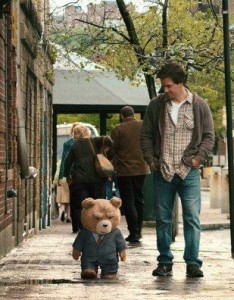TED on arrival
a review from across the pond by Mr. Gareth C. Evans
(TED is available for purchase on Blu-ray
and DVD
).
It was inevitable that Seth MacFarlane would eventually break into the movies. With Family Guy episodes currently at least one miss for every hit and rumours that the series is nearing the end of its tenure, MacFarlane’s future would seem to be in the comedy feature arena. Oscars next? Well everyone’s happy he’s hosting them next year, that’s for sure.
Mark Wahlberg makes a welcome return to comedy as John Bennett, a 35 year-old guy more or less happy with everything – his job at a car rental agency, his nice Newbury Street-ish apartment in Boston and his unfeasibly hot girlfriend Lori (Family Guy alumni Mila Kunis). He’s also very content with his best friend, a knee-high talking teddy bear named Ted (voiced by MacFarlane) brought miraculously to life by a childhood wish when John was 8. Lori feels Ted is bringing John down: rather than sipping a coffee in the morning while reading the papers, the strung-out pair smoke pot and re-watch Flash Gordon (with which they are obsessed). John can’t bring himself to ask Ted to get his own place and so begins a catalogue of errors on John’s part as he constantly lets Lori down, blaming Ted for his own shortcomings. It’s like what might have happened if Andy hadn’t gone to college at the end of Toy Story.
“When I was a child, I used to speak like a child, think like a child, reason like a child; when I became a man, I did away with childish things.” – 1 Corinthians 13:11
 Wahlberg shows his true calling is comedic roles (versus action) making John likeable despite the character’s inconsistencies (here’s a guy happy to smoke pot every morning and do coke when the opportunity presents itself, yet blanches when his girlfriend curses). Directing and co-starring, MacFarlane plays it relatively safe with Ted. Newcomers to his world may be shocked and offended at a lot of the jokes, but the already-initiated will recognise the F-Guy beats – Patrick Stewart cameo, fondness for crooner music, taboo-busting humour, the European guy who’s trying to sound American, pop culture, music and movie references – there are even a couple of cutaway gags. But do Family Guy’s spiritual concerns (or lack of) translate from small to big screen too?
Wahlberg shows his true calling is comedic roles (versus action) making John likeable despite the character’s inconsistencies (here’s a guy happy to smoke pot every morning and do coke when the opportunity presents itself, yet blanches when his girlfriend curses). Directing and co-starring, MacFarlane plays it relatively safe with Ted. Newcomers to his world may be shocked and offended at a lot of the jokes, but the already-initiated will recognise the F-Guy beats – Patrick Stewart cameo, fondness for crooner music, taboo-busting humour, the European guy who’s trying to sound American, pop culture, music and movie references – there are even a couple of cutaway gags. But do Family Guy’s spiritual concerns (or lack of) translate from small to big screen too?
MacFarlane and FG’s most relatively sensible and academic character Brian are both pretty much unreserved in their atheistic outlook (one episode even revolves around Brian’s stance on faith). Sure, Peter always ends up “doing the right thing” and his family and marriage always stay intact: its depiction of God involves the Lord taking people out with a sniper rifle. That’s the level of spiritual nourishment Family Guy offers (hilarious as it is).
How about Ted?
The key message that Ted can offer is that we all have a talking bear. Maybe not for real (and if you do, stop reading this and seek advice), but we have past habits, attitudes, routines and vices that we find difficult to escape, and without which we may have a fuller, more mature life. When is the point that you become an adult? Is it when you move out of home? When you have a job? When you reach a particular age? When we can drink? (By that rationale, us Brits reach adulthood a full three years before our American cousins). It’s the question I’m asking myself right now…
Adulthood happened to me before I had the chance to invite it in – in my late 20’s I started a teaching career, got married, bought a house and had a daughter, all in the space of 18 months – and I’m still recovering! Did something similar happen to you? I was quite happy studying film at University whilst working at a movie theatre and a music/DVD store thanks very much. I love my new life, but is it wrong that I still want some time to myself to watch Die Hard once in a while? It’s perfectly natural that we should desire a little personal down-time (in fact it’s essential), but it’s what we decide to do with that time once we have it that matters.
“Work hard and become a leader; be lazy and become a slave” – Proverbs 12:24
 What’s enjoyable about Ted is that, unlike Woody and Buzz, his existence is not a secret to the world. After a brief fling with a celebrity, Ted can’t help but let partying and mayhem rule his life (a downfall caught in the film’s brilliant opening montage). Ted doesn’t sit limp on a shelf waiting until John is out the room before coming to life. He’s always there, in public and in private, a constant and convenient reminder of John’s arrested development. Yet it is not Ted’s attitude that we are led to despise. Teds will be Teds… but John has chosen to commit himself to Lori, chosen to work for a living, chosen to contribute to the bills, and there are some things out of joint that are not conducive to that commitment. The problem isn’t Ted, it is John – it’s how John uses Ted. And Ted is the first to realise it when their friendship begins to fracture.
What’s enjoyable about Ted is that, unlike Woody and Buzz, his existence is not a secret to the world. After a brief fling with a celebrity, Ted can’t help but let partying and mayhem rule his life (a downfall caught in the film’s brilliant opening montage). Ted doesn’t sit limp on a shelf waiting until John is out the room before coming to life. He’s always there, in public and in private, a constant and convenient reminder of John’s arrested development. Yet it is not Ted’s attitude that we are led to despise. Teds will be Teds… but John has chosen to commit himself to Lori, chosen to work for a living, chosen to contribute to the bills, and there are some things out of joint that are not conducive to that commitment. The problem isn’t Ted, it is John – it’s how John uses Ted. And Ted is the first to realise it when their friendship begins to fracture.
Ted: Lori was right about you: you cannot take responsibility for anything that goes on in your life.
John Bennett: Oh, and you can?
Ted: I dont have to, Im a f—ing teddy bear.
Perhaps we never led the type of life that John does in the film, but we can recognise the inertia, the wilful ignorance of that giant step that must be taken to enter the next stage of life, particularly for those who’ve committed to the Christian walk: a new life, maturity and focus. Like getting down to the gym or improving your diet, we know the benefits – it’s just making the choice to commit fully without looking back.
 “Put to death therefore what is earthly in you: sexual immorality, impurity, passion, evil desire, and covetousness… In these you too once walked, when you were living in them. But now you must put them all away: anger, wrath, malice, slander, and obscene talk from your mouth… seeing that you have put off the old self with its practices and have put on the new self, which is being renewed in knowledge after the image of its creator.” – Colossians 3:5-10
“Put to death therefore what is earthly in you: sexual immorality, impurity, passion, evil desire, and covetousness… In these you too once walked, when you were living in them. But now you must put them all away: anger, wrath, malice, slander, and obscene talk from your mouth… seeing that you have put off the old self with its practices and have put on the new self, which is being renewed in knowledge after the image of its creator.” – Colossians 3:5-10
Although comedic and crass, the story provides viewers with a visceral image of John’s childhood finally torn away, the stuff of his life strewn about so that he must face the inevitable need to move on, to grow. Despite the dizzy spin of Seth MacFarlane’s story, this leaves us with some great questions for discussion:
-
Are their lingering “Teds” in our life, habits and disposition?
-
What needs to be torn up, left behind, or reconciled?
-
Are we trying to live two lives, our “old self” along with new life and commitments?
-
Is it simply cultural tradition – a human-based expectation of maturity – that calls us to make this alteration? Or is there something inherently honorable and intrinsic to our nature and design that calls us to this change?
“…the truth is in Jesus, to put off your old self, which belongs to your former manner of life and is corrupt through deceitful desires, and to be renewed in the spirit of your minds, and to put on the new self, created after the likeness of God…” – Ephesians 4:17-24



